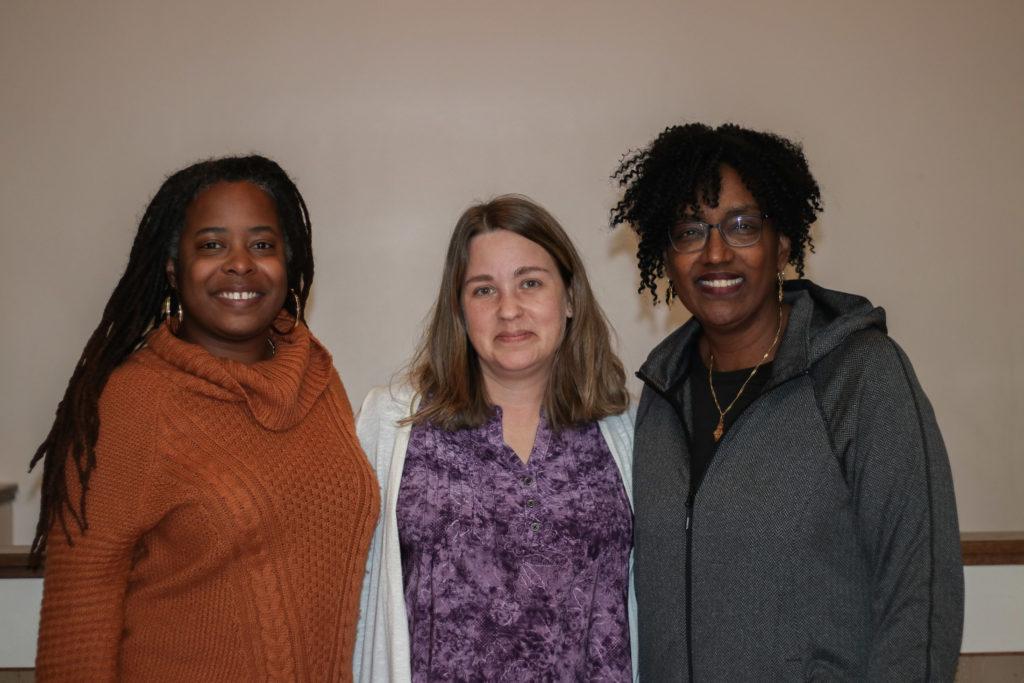In Fall 2019, the College will offer the course “Digital Stories for Social Justice,” a new model that combines a class focusing on a social justice topic with a digital lab. The class is a collaboration among Professors Tammy Nyden, philosophy, Stephanie Jones, education and Kesho Scott, sociology. The trio received pilot funding from Grinnell’s Innovation Fund.
The Innovation Fund awards up to $450,000 each year to pilot projects that offer innovative additions to campus life and learning by allowing faculty, students and staff the opportunity to expand the scope of the College’s course offerings into new and unexpected areas. Pilot projects receive funding for either one or three years. The other pilot project funded this year was for the continuation of the development of the Grinnell College Immersive Environments Lab (GCIEL). The Innovation Fund also awards $50,000 annually for one-time planning projects such as this year’s awardee, the “Dialogue and Resolution” program. This program will focus on implementing alternative dispute resolution within the Grinnell community.
The Digital Stories project aims to collect a diverse array of personal narratives through both audio and video recordings. These digital stories will then be made available for students’ projects as well as other uses. “We’re digitizing these stories and making them available to institutions, to community-based groups, to people who write grants,” Scott said. “Digitizing is an equalizer in access to information … and it’s powerful.”
The program organizers did not profess to be technologically adept themselves, but plan to reach out across disciplines to their colleagues to build the technological foundation for the course.
“That’s one of the strengths of why we got the grant,” Scott explained. “Because we’re proposing something that’s not only out of the box and functional to building coalition but we’re also making technology accessible to us and then we will teach that to others.”
Nyden described how once the archive is established, students can create projects from public service announcements to podcast series. She stated that a long-term hope of the project is to fill in gaps of knowledge within advocacy work, such as with social media usage. Scott connected the aims of the program to those of social justice movements that have grown through social media.
“Through storytelling my hope is that people hear a story of others and realize ‘that’s me too,’… almost like a ‘#metoo movement,’” said Scott.
One initial focus of the class will be mental health advocacy. This issue is central to Nyden’s work with her organization, “Mothers on the Frontline,” which supports mothers of children with mental health challenges by providing a support network to enable advocacy among its members. Nyden founded the group with Dionne Bensonsmith, Claremont Colleges professor, based on their shared experience raising children with mental health challenges and corresponding frustration with the lack of support and advocacy structures.
Nyden stated that storytelling is a crucial tool for mental health advocacy because personal narratives prove that mental health is a nondiscriminatory issue.
“It cuts through socioeconomic, racial, religious lines; it cuts through city and country. Everyone is dealing with it but nobody is talking about it.”
“Mental health is the most complex social problem, public problem in our society because it is thought of as medical and what is medical is private,” Scott agreed.
Both Scott and Nyden emphasized the importance of intersectionality in the program, and in advocacy work in general.
“I got involved in this project because I’ve learned the lessons from social movements: that people who are involved in change must address their own internalized issues … and that in dealing with those internal issues to build coalition you have to be intersectional, because our identities have multiple parts. … [The project] was projected as a way of looking at those problems that people have in families and communities because we have intersectional lives,” Scott said.
“We want to talk about how education policy, mental health policy and racism intersect. [We want to talk] to people in schools, in prisons,” Nyden said
Interested students can register for the course next semester and, the professors hope, in semesters to come.

Faran.



























































